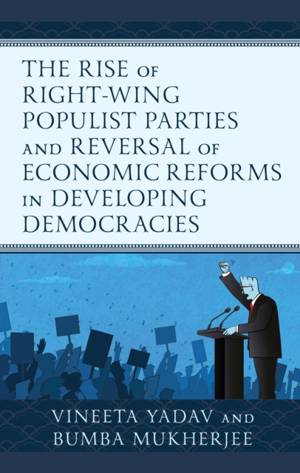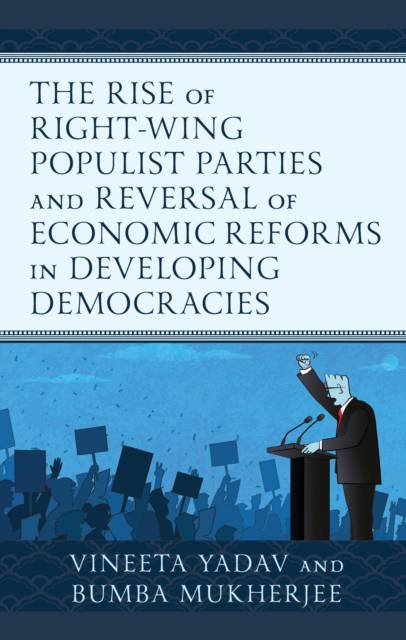
- Afhalen na 1 uur in een winkel met voorraad
- Gratis thuislevering in België vanaf € 30
- Ruim aanbod met 7 miljoen producten
- Afhalen na 1 uur in een winkel met voorraad
- Gratis thuislevering in België vanaf € 30
- Ruim aanbod met 7 miljoen producten
Zoeken
The Rise of Right-Wing Populist Parties and Reversal of Economic Reforms in Developing Democracies
Vineeta Yadav, Bumba Mukherjee
Hardcover | Engels
€ 195,45
+ 390 punten
Omschrijving
When and why are right-wing populist (RWP) parties electorally successful in developing democracies? What are the consequences of their electoral success? The Rise of Right-Wing Populist Parties and Reversal of Economic Reforms in Developing Democracies presents an original theoretical framework that is grounded in the socio-economic characteristics of developing countries to answer these questions. Vineeta Yadav and Bumba Mukherjee argue that when a sudden reversal financial crisis occurs in a highly clientelist developing democracy, RWP parties can successfully win the electoral support of voters, particularly those belonging to the traditional group in society. They secure their win by promising to adopt nationalist economic policies to restore the social and economic status of voters, particularly those belonging to the traditional groups. Upon winning elections, they deliver on this program by adopting protectionist trade policies and reducing the independence of their country's central banks so they can manipulate monetary policy to support dominant group voters. Consequently, they reverse key elements of economic globalization. To provide evidence for these claims the authors conduct in-depth analyses of two important cases - the Bharatiya Janata Party (BJP) of India and the Partido Social Liberal (PSL) of Brazil using survey experiments and qualitative evidence, and they analyze Time-Series Cross-Sectonial data for 58 developing countries from 1980 to 2018 to establish the generalizability of their arguments.
Specificaties
Betrokkenen
- Auteur(s):
- Uitgeverij:
Inhoud
- Aantal bladzijden:
- 270
- Taal:
- Engels
Eigenschappen
- Productcode (EAN):
- 9781666924534
- Verschijningsdatum:
- 12/01/2024
- Uitvoering:
- Hardcover
- Formaat:
- Genaaid
- Afmetingen:
- 152 mm x 229 mm
- Gewicht:
- 566 g

Alleen bij Standaard Boekhandel
+ 390 punten op je klantenkaart van Standaard Boekhandel
Beoordelingen
We publiceren alleen reviews die voldoen aan de voorwaarden voor reviews. Bekijk onze voorwaarden voor reviews.







